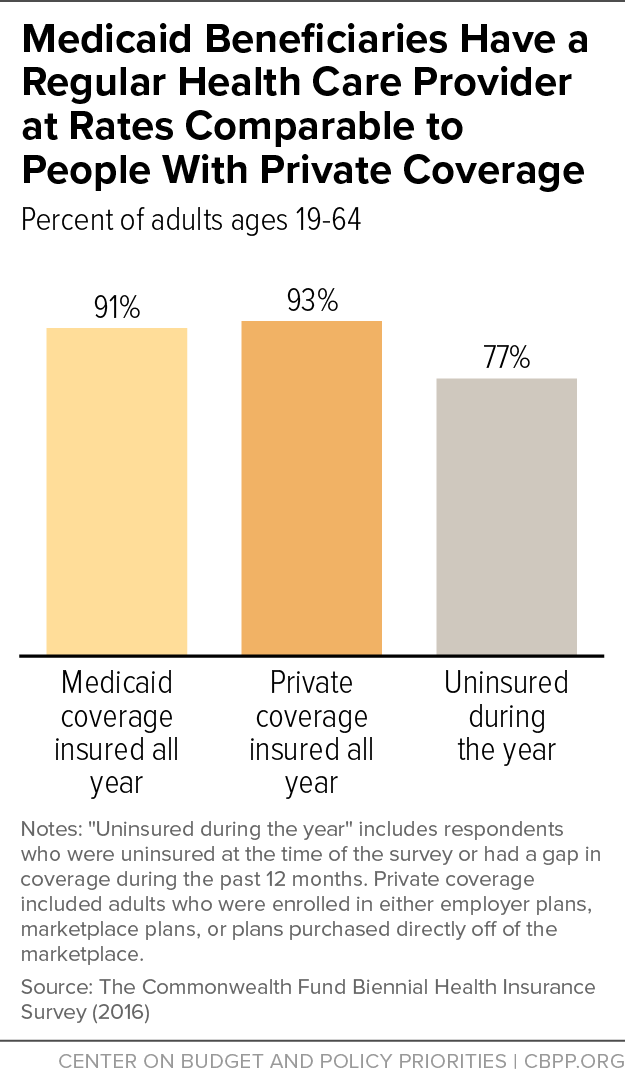BEYOND THE NUMBERS
Senator Bill Cassidy’s claim that “patients covered through Medicaid often have worse outcomes than those who are covered through other forms of insurance” is just the latest example of congressional Republicans selectively using data to portray Medicaid and other safety net programs in a negative light, while downplaying much more extensive data that show otherwise.
The studies that congressional Republicans frequently cite, such as those in then-House Budget Committee Chairman Paul Ryan’s 2014 report on poverty, include studies finding that Medicaid enrollees tend to be less healthy than people with other coverage. To some critics, that implies that Medicaid somehow harms beneficiaries’ health. But many studies show that Medicaid serves a sicker group of people with greater health care needs than the privately insured population to begin with.
Senator Cassidy’s statement, like the Ryan report, ignores the wide body of research showing that Medicaid provides low-income Americans with access to needed preventive services and medical care:
- Medicaid improves beneficiaries’ health. Medicaid beneficiaries have comparable access to care to people with private insurance, studies show. Medicaid has helped make millions healthier by improving access to preventive and primary care and protecting against (and providing care for) chronic conditions like diabetes. Medicaid coverage expansions for low-income adults in Arizona, Maine, and New York reduced mortality by 6.1 percent, research published in The New England Journal of Medicine shows. Likewise, Massachusetts’ 2006 expansion of Medicaid and other health coverage significantly reduced mortality, especially deaths linked to the lack of appropriate health care. Finally, Medicaid coverage produces long-term health benefits; for example, African Americans who were eligible for Medicaid as children had lower mortality as teenagers and fewer hospitalizations and emergency room visits as adults.
- Medicaid beneficiaries are largely happy with their coverage and care. They’re likelier to rate their quality of care highly than people with private coverage or no coverage. Moreover, 88 percent of beneficiaries reported that they were “satisfied” or “very satisfied” with the choice of doctors that their current insurance provides — compared to 86 percent of people buying private marketplace coverage. And Medicaid beneficiaries have a regular health care provider at rates comparable to people with private coverage (see graph).
Similarly, Medicaid beneficiaries in one survey ranked their overall care at an average of 7.9 out of 10, and nearly half rated their coverage at a 9 or 10. Some 84 percent reported that they had access to all of their needed care in the past six months, and 83 percent reported having a usual source of care. These results are similar to the most recent surveys for people with private coverage, and much higher than those for the uninsured.
- Medicaid has benefits beyond health. Medicaid coverage produces long-term educational benefits for kids, including higher educational attainment, and improves families’ financial well-being by protecting against high out-of-pocket medical costs. In a study of Arkansas and Kentucky, Medicaid expansion made people more financially secure: the share of people having trouble paying their medical bills dropped by 25 percent. Medicaid beneficiaries are less likely to have trouble paying for care — and less likely to skip needed care due to cost — than people with private coverage or the uninsured. Research also shows that people who were eligible for Medicaid as children have higher incomes as adults.
Ironically, the threat to Medicaid beneficiaries’ health comes not from Medicaid, as Senator Cassidy suggests, but from proposals to cap federal Medicaid funding, which Senator Cassidy supports. He and other congressional Republicans have repeatedly made false and misleading claims about Medicaid to justify sweeping cuts, including imposing a per capita cap. Deep cuts in federal funding would force states to contribute much more of their own funding or, far likelier, substantially cut provider payments, eligibility, and benefits, with the cuts growing each year. Broad Medicaid cuts would threaten access to and quality of care, making Senator Cassidy’s claims more a reality and threatening the health of millions of low-income people.

